Leadership, Communication, and Culture: Thomas Cook Report
VerifiedAdded on 2020/01/21
|13
|4489
|192
Report
AI Summary
This report provides an in-depth analysis of the management styles, leadership characteristics, communication processes, and organizational culture within the Thomas Cook travel company. It examines the autocratic and permissive management styles employed, highlighting the leadership traits of senior managers and the effectiveness of the company's communication channels. The report also delves into the organizational culture, emphasizing its impact on employee behavior and company performance. Furthermore, it includes a SWOT analysis of a management trainee, identifying strengths, weaknesses, opportunities, and threats. The report concludes by emphasizing the importance of continuous change within the company to adapt to market demands and maintain a competitive edge. The report is a valuable resource for students studying leadership management, offering insights into real-world business practices and strategies.
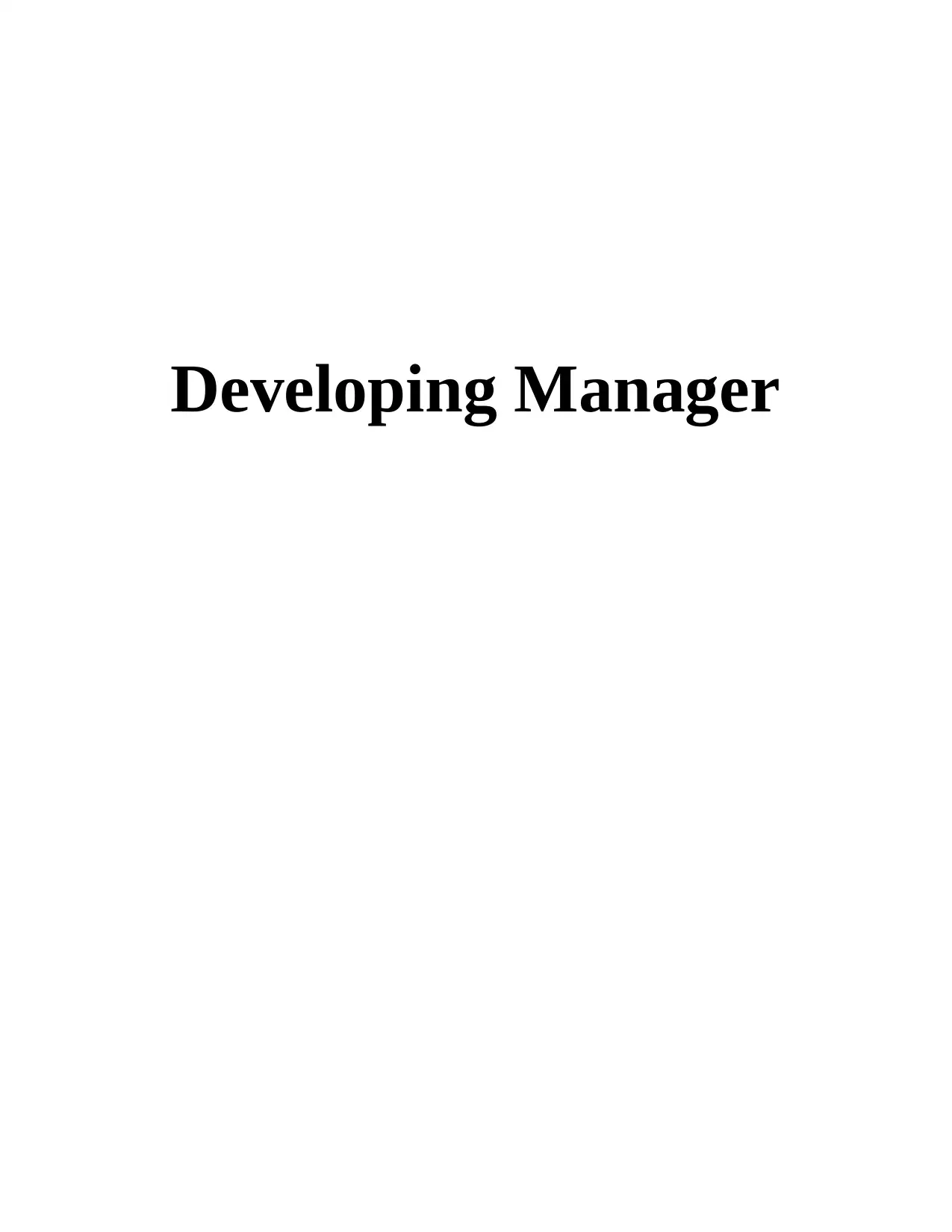
Developing Manager
Paraphrase This Document
Need a fresh take? Get an instant paraphrase of this document with our AI Paraphraser
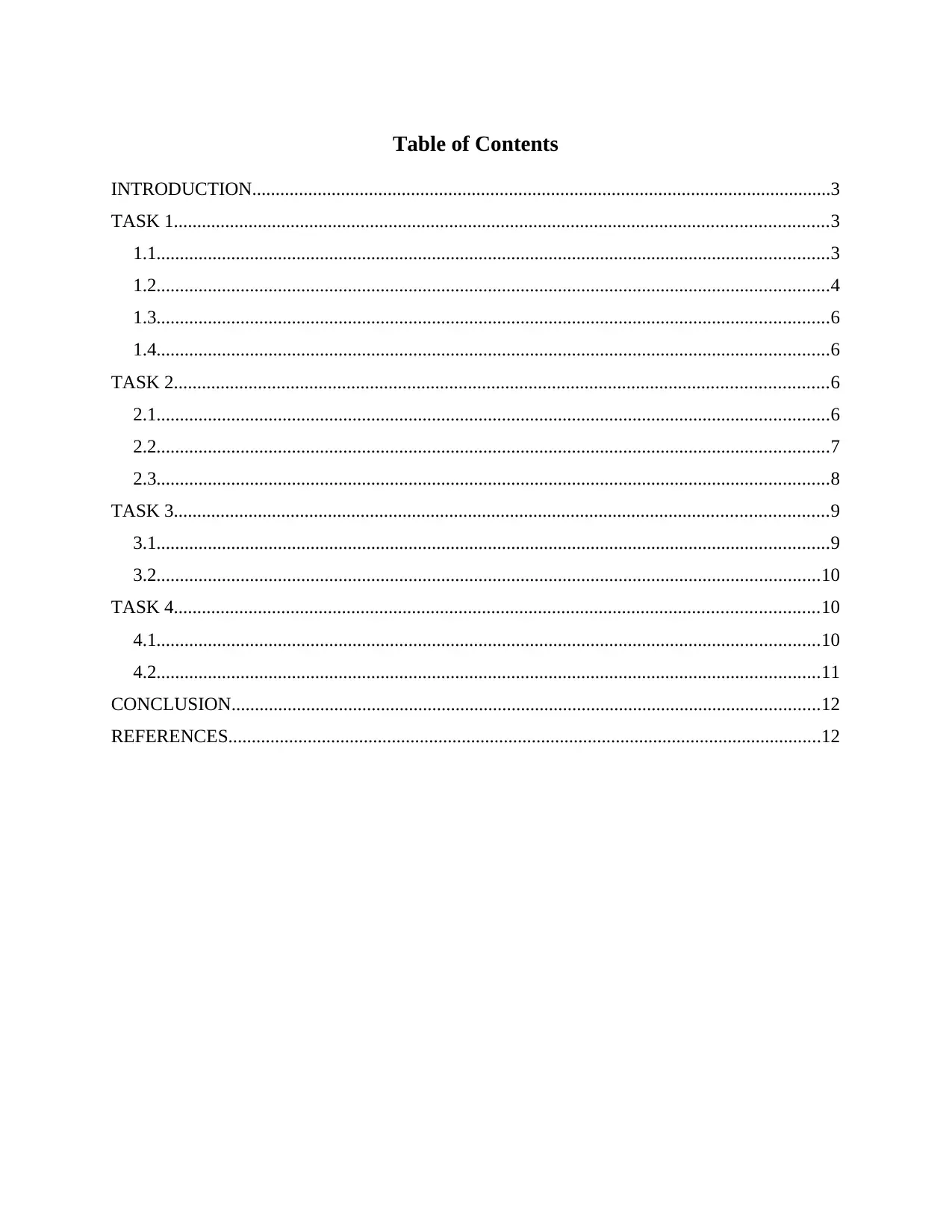
Table of Contents
INTRODUCTION............................................................................................................................3
TASK 1............................................................................................................................................3
1.1................................................................................................................................................3
1.2................................................................................................................................................4
1.3................................................................................................................................................6
1.4................................................................................................................................................6
TASK 2............................................................................................................................................6
2.1................................................................................................................................................6
2.2................................................................................................................................................7
2.3................................................................................................................................................8
TASK 3............................................................................................................................................9
3.1................................................................................................................................................9
3.2..............................................................................................................................................10
TASK 4..........................................................................................................................................10
4.1..............................................................................................................................................10
4.2..............................................................................................................................................11
CONCLUSION..............................................................................................................................12
REFERENCES...............................................................................................................................12
INTRODUCTION............................................................................................................................3
TASK 1............................................................................................................................................3
1.1................................................................................................................................................3
1.2................................................................................................................................................4
1.3................................................................................................................................................6
1.4................................................................................................................................................6
TASK 2............................................................................................................................................6
2.1................................................................................................................................................6
2.2................................................................................................................................................7
2.3................................................................................................................................................8
TASK 3............................................................................................................................................9
3.1................................................................................................................................................9
3.2..............................................................................................................................................10
TASK 4..........................................................................................................................................10
4.1..............................................................................................................................................10
4.2..............................................................................................................................................11
CONCLUSION..............................................................................................................................12
REFERENCES...............................................................................................................................12
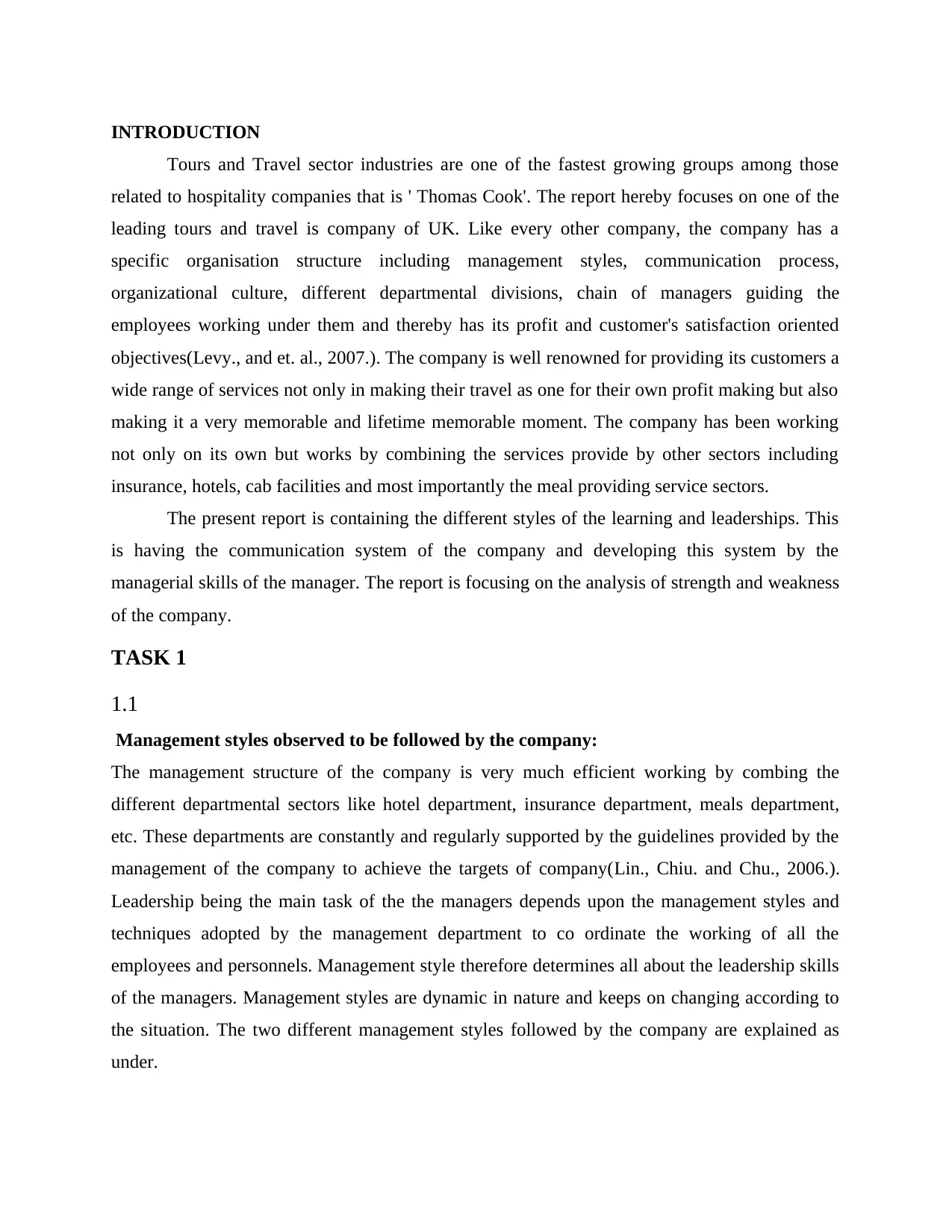
INTRODUCTION
Tours and Travel sector industries are one of the fastest growing groups among those
related to hospitality companies that is ' Thomas Cook'. The report hereby focuses on one of the
leading tours and travel is company of UK. Like every other company, the company has a
specific organisation structure including management styles, communication process,
organizational culture, different departmental divisions, chain of managers guiding the
employees working under them and thereby has its profit and customer's satisfaction oriented
objectives(Levy., and et. al., 2007.). The company is well renowned for providing its customers a
wide range of services not only in making their travel as one for their own profit making but also
making it a very memorable and lifetime memorable moment. The company has been working
not only on its own but works by combining the services provide by other sectors including
insurance, hotels, cab facilities and most importantly the meal providing service sectors.
The present report is containing the different styles of the learning and leaderships. This
is having the communication system of the company and developing this system by the
managerial skills of the manager. The report is focusing on the analysis of strength and weakness
of the company.
TASK 1
1.1
Management styles observed to be followed by the company:
The management structure of the company is very much efficient working by combing the
different departmental sectors like hotel department, insurance department, meals department,
etc. These departments are constantly and regularly supported by the guidelines provided by the
management of the company to achieve the targets of company(Lin., Chiu. and Chu., 2006.).
Leadership being the main task of the the managers depends upon the management styles and
techniques adopted by the management department to co ordinate the working of all the
employees and personnels. Management style therefore determines all about the leadership skills
of the managers. Management styles are dynamic in nature and keeps on changing according to
the situation. The two different management styles followed by the company are explained as
under.
Tours and Travel sector industries are one of the fastest growing groups among those
related to hospitality companies that is ' Thomas Cook'. The report hereby focuses on one of the
leading tours and travel is company of UK. Like every other company, the company has a
specific organisation structure including management styles, communication process,
organizational culture, different departmental divisions, chain of managers guiding the
employees working under them and thereby has its profit and customer's satisfaction oriented
objectives(Levy., and et. al., 2007.). The company is well renowned for providing its customers a
wide range of services not only in making their travel as one for their own profit making but also
making it a very memorable and lifetime memorable moment. The company has been working
not only on its own but works by combining the services provide by other sectors including
insurance, hotels, cab facilities and most importantly the meal providing service sectors.
The present report is containing the different styles of the learning and leaderships. This
is having the communication system of the company and developing this system by the
managerial skills of the manager. The report is focusing on the analysis of strength and weakness
of the company.
TASK 1
1.1
Management styles observed to be followed by the company:
The management structure of the company is very much efficient working by combing the
different departmental sectors like hotel department, insurance department, meals department,
etc. These departments are constantly and regularly supported by the guidelines provided by the
management of the company to achieve the targets of company(Lin., Chiu. and Chu., 2006.).
Leadership being the main task of the the managers depends upon the management styles and
techniques adopted by the management department to co ordinate the working of all the
employees and personnels. Management style therefore determines all about the leadership skills
of the managers. Management styles are dynamic in nature and keeps on changing according to
the situation. The two different management styles followed by the company are explained as
under.
⊘ This is a preview!⊘
Do you want full access?
Subscribe today to unlock all pages.

Trusted by 1+ million students worldwide

Autocratic Management style: As the name suggests, this style of management is
adopted by the managers when they find it very much necessary to apply new policies
and ideas. For bringing about necessary change in the organization and in above
mentioned situation the expertise of managers need to be applied as they cannot take risk
by simply relying upon the knowledge of the subordinates(Bonney., and et. al., 2009.).
Autocratic style when applied determines something serious that needs to be applied
urgently to cater the changing market situation or preferences of customers.
Permissive Management style: Such management style is adopted by the managers
when they feel the need to gather the information and adopt new ideas or change in plans
required from the subordinate. The changes required are analysed and there influence on
overall objectives of the firm are researched and thereby put into action. This type of
techniques motivates the morale of the employees.
1.2
Leadership characteristics of Senior Managers:
The success of company depends major on how the manager effectively utilize their skills,
abilities and experience to provide guidelines and expertise to the employees and subordinates.
Every personnel working in the organization needs to be coordinated with the others in the
organization to make the team work as the reason behind strong position of the company. The list
of characteristics of the senior managers is as below:
The senior managers of the company have one of the most required characteristics of
being able to lead and manage the process of their related department. Each of the
manager is responsible and accredited as the reason behind effective working of there
department(Jamali. and Mirshak., 2007.).
The managers are super courageous towards the work assigned to them. There is no fear
factor in their personality. They are expected to stand themselves strong enough to
withstand against any issue or tackle any problem. Thus the organization benefits by the
strong support system of its managers including the work efforts of its employees.
The managers effectively present the company in all situation demanding the same. They
are efficient in delivery a strong image of their company to all of its stakeholders.
adopted by the managers when they find it very much necessary to apply new policies
and ideas. For bringing about necessary change in the organization and in above
mentioned situation the expertise of managers need to be applied as they cannot take risk
by simply relying upon the knowledge of the subordinates(Bonney., and et. al., 2009.).
Autocratic style when applied determines something serious that needs to be applied
urgently to cater the changing market situation or preferences of customers.
Permissive Management style: Such management style is adopted by the managers
when they feel the need to gather the information and adopt new ideas or change in plans
required from the subordinate. The changes required are analysed and there influence on
overall objectives of the firm are researched and thereby put into action. This type of
techniques motivates the morale of the employees.
1.2
Leadership characteristics of Senior Managers:
The success of company depends major on how the manager effectively utilize their skills,
abilities and experience to provide guidelines and expertise to the employees and subordinates.
Every personnel working in the organization needs to be coordinated with the others in the
organization to make the team work as the reason behind strong position of the company. The list
of characteristics of the senior managers is as below:
The senior managers of the company have one of the most required characteristics of
being able to lead and manage the process of their related department. Each of the
manager is responsible and accredited as the reason behind effective working of there
department(Jamali. and Mirshak., 2007.).
The managers are super courageous towards the work assigned to them. There is no fear
factor in their personality. They are expected to stand themselves strong enough to
withstand against any issue or tackle any problem. Thus the organization benefits by the
strong support system of its managers including the work efforts of its employees.
The managers effectively present the company in all situation demanding the same. They
are efficient in delivery a strong image of their company to all of its stakeholders.
Paraphrase This Document
Need a fresh take? Get an instant paraphrase of this document with our AI Paraphraser
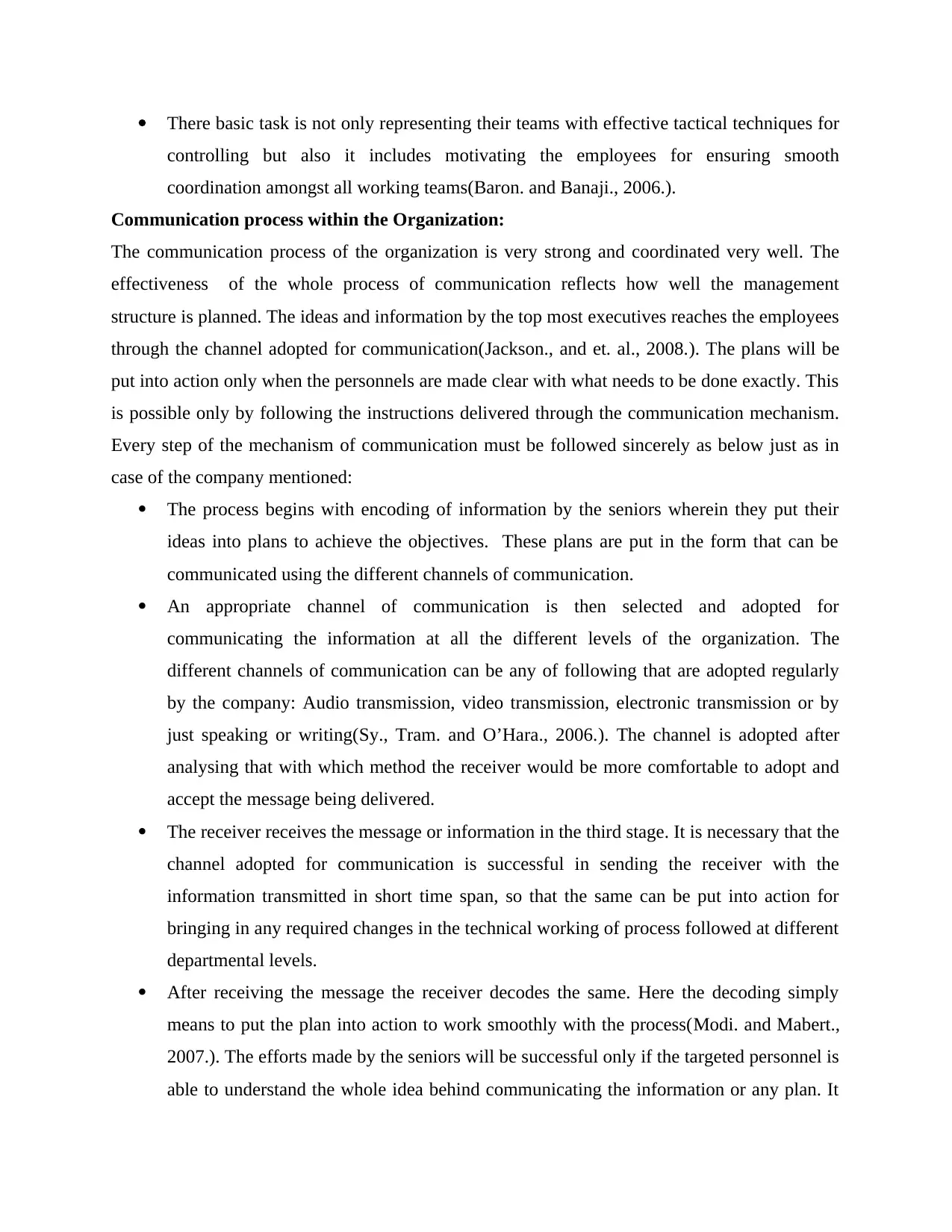
There basic task is not only representing their teams with effective tactical techniques for
controlling but also it includes motivating the employees for ensuring smooth
coordination amongst all working teams(Baron. and Banaji., 2006.).
Communication process within the Organization:
The communication process of the organization is very strong and coordinated very well. The
effectiveness of the whole process of communication reflects how well the management
structure is planned. The ideas and information by the top most executives reaches the employees
through the channel adopted for communication(Jackson., and et. al., 2008.). The plans will be
put into action only when the personnels are made clear with what needs to be done exactly. This
is possible only by following the instructions delivered through the communication mechanism.
Every step of the mechanism of communication must be followed sincerely as below just as in
case of the company mentioned:
The process begins with encoding of information by the seniors wherein they put their
ideas into plans to achieve the objectives. These plans are put in the form that can be
communicated using the different channels of communication.
An appropriate channel of communication is then selected and adopted for
communicating the information at all the different levels of the organization. The
different channels of communication can be any of following that are adopted regularly
by the company: Audio transmission, video transmission, electronic transmission or by
just speaking or writing(Sy., Tram. and O’Hara., 2006.). The channel is adopted after
analysing that with which method the receiver would be more comfortable to adopt and
accept the message being delivered.
The receiver receives the message or information in the third stage. It is necessary that the
channel adopted for communication is successful in sending the receiver with the
information transmitted in short time span, so that the same can be put into action for
bringing in any required changes in the technical working of process followed at different
departmental levels.
After receiving the message the receiver decodes the same. Here the decoding simply
means to put the plan into action to work smoothly with the process(Modi. and Mabert.,
2007.). The efforts made by the seniors will be successful only if the targeted personnel is
able to understand the whole idea behind communicating the information or any plan. It
controlling but also it includes motivating the employees for ensuring smooth
coordination amongst all working teams(Baron. and Banaji., 2006.).
Communication process within the Organization:
The communication process of the organization is very strong and coordinated very well. The
effectiveness of the whole process of communication reflects how well the management
structure is planned. The ideas and information by the top most executives reaches the employees
through the channel adopted for communication(Jackson., and et. al., 2008.). The plans will be
put into action only when the personnels are made clear with what needs to be done exactly. This
is possible only by following the instructions delivered through the communication mechanism.
Every step of the mechanism of communication must be followed sincerely as below just as in
case of the company mentioned:
The process begins with encoding of information by the seniors wherein they put their
ideas into plans to achieve the objectives. These plans are put in the form that can be
communicated using the different channels of communication.
An appropriate channel of communication is then selected and adopted for
communicating the information at all the different levels of the organization. The
different channels of communication can be any of following that are adopted regularly
by the company: Audio transmission, video transmission, electronic transmission or by
just speaking or writing(Sy., Tram. and O’Hara., 2006.). The channel is adopted after
analysing that with which method the receiver would be more comfortable to adopt and
accept the message being delivered.
The receiver receives the message or information in the third stage. It is necessary that the
channel adopted for communication is successful in sending the receiver with the
information transmitted in short time span, so that the same can be put into action for
bringing in any required changes in the technical working of process followed at different
departmental levels.
After receiving the message the receiver decodes the same. Here the decoding simply
means to put the plan into action to work smoothly with the process(Modi. and Mabert.,
2007.). The efforts made by the seniors will be successful only if the targeted personnel is
able to understand the whole idea behind communicating the information or any plan. It
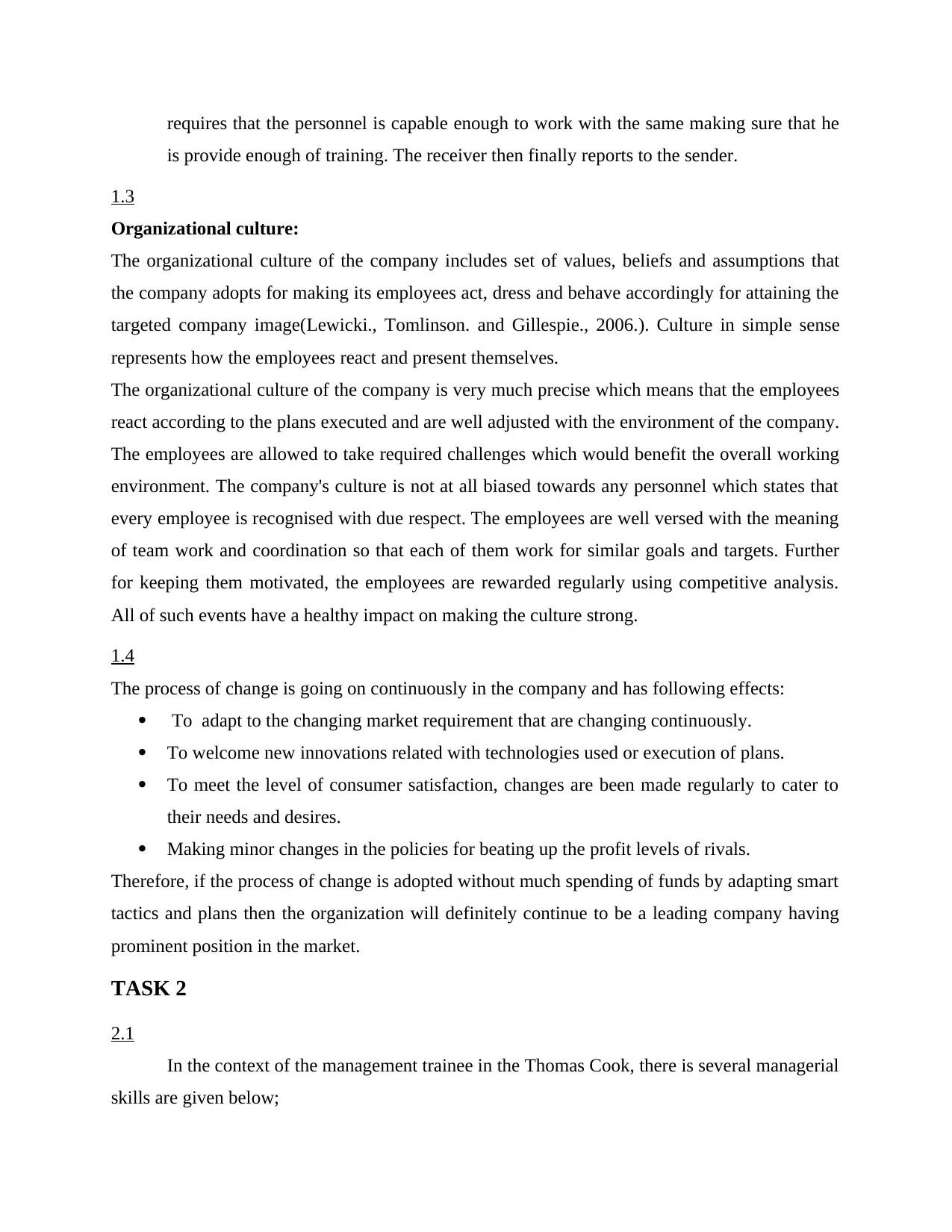
requires that the personnel is capable enough to work with the same making sure that he
is provide enough of training. The receiver then finally reports to the sender.
1.3
Organizational culture:
The organizational culture of the company includes set of values, beliefs and assumptions that
the company adopts for making its employees act, dress and behave accordingly for attaining the
targeted company image(Lewicki., Tomlinson. and Gillespie., 2006.). Culture in simple sense
represents how the employees react and present themselves.
The organizational culture of the company is very much precise which means that the employees
react according to the plans executed and are well adjusted with the environment of the company.
The employees are allowed to take required challenges which would benefit the overall working
environment. The company's culture is not at all biased towards any personnel which states that
every employee is recognised with due respect. The employees are well versed with the meaning
of team work and coordination so that each of them work for similar goals and targets. Further
for keeping them motivated, the employees are rewarded regularly using competitive analysis.
All of such events have a healthy impact on making the culture strong.
1.4
The process of change is going on continuously in the company and has following effects:
To adapt to the changing market requirement that are changing continuously.
To welcome new innovations related with technologies used or execution of plans.
To meet the level of consumer satisfaction, changes are been made regularly to cater to
their needs and desires.
Making minor changes in the policies for beating up the profit levels of rivals.
Therefore, if the process of change is adopted without much spending of funds by adapting smart
tactics and plans then the organization will definitely continue to be a leading company having
prominent position in the market.
TASK 2
2.1
In the context of the management trainee in the Thomas Cook, there is several managerial
skills are given below;
is provide enough of training. The receiver then finally reports to the sender.
1.3
Organizational culture:
The organizational culture of the company includes set of values, beliefs and assumptions that
the company adopts for making its employees act, dress and behave accordingly for attaining the
targeted company image(Lewicki., Tomlinson. and Gillespie., 2006.). Culture in simple sense
represents how the employees react and present themselves.
The organizational culture of the company is very much precise which means that the employees
react according to the plans executed and are well adjusted with the environment of the company.
The employees are allowed to take required challenges which would benefit the overall working
environment. The company's culture is not at all biased towards any personnel which states that
every employee is recognised with due respect. The employees are well versed with the meaning
of team work and coordination so that each of them work for similar goals and targets. Further
for keeping them motivated, the employees are rewarded regularly using competitive analysis.
All of such events have a healthy impact on making the culture strong.
1.4
The process of change is going on continuously in the company and has following effects:
To adapt to the changing market requirement that are changing continuously.
To welcome new innovations related with technologies used or execution of plans.
To meet the level of consumer satisfaction, changes are been made regularly to cater to
their needs and desires.
Making minor changes in the policies for beating up the profit levels of rivals.
Therefore, if the process of change is adopted without much spending of funds by adapting smart
tactics and plans then the organization will definitely continue to be a leading company having
prominent position in the market.
TASK 2
2.1
In the context of the management trainee in the Thomas Cook, there is several managerial
skills are given below;
⊘ This is a preview!⊘
Do you want full access?
Subscribe today to unlock all pages.

Trusted by 1+ million students worldwide
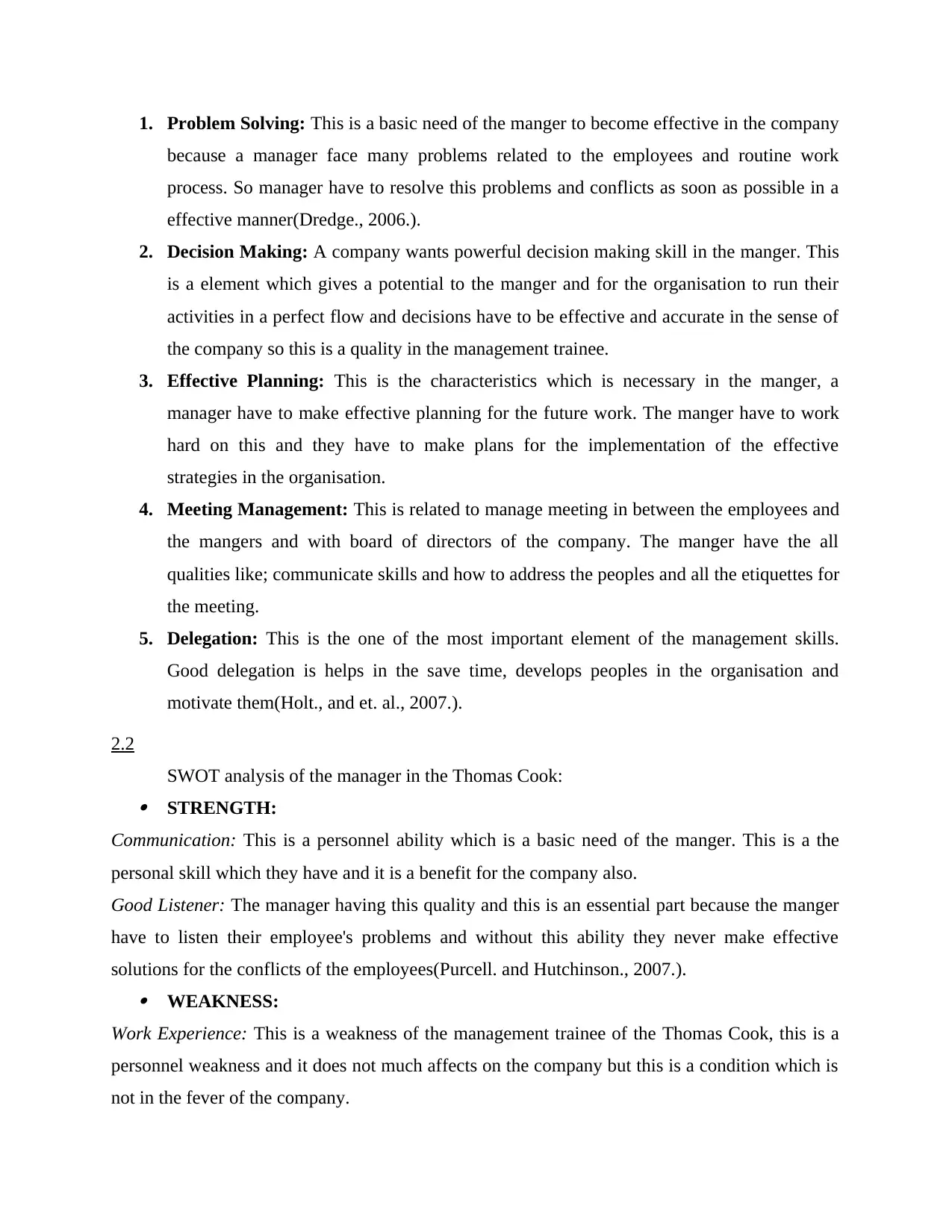
1. Problem Solving: This is a basic need of the manger to become effective in the company
because a manager face many problems related to the employees and routine work
process. So manager have to resolve this problems and conflicts as soon as possible in a
effective manner(Dredge., 2006.).
2. Decision Making: A company wants powerful decision making skill in the manger. This
is a element which gives a potential to the manger and for the organisation to run their
activities in a perfect flow and decisions have to be effective and accurate in the sense of
the company so this is a quality in the management trainee.
3. Effective Planning: This is the characteristics which is necessary in the manger, a
manager have to make effective planning for the future work. The manger have to work
hard on this and they have to make plans for the implementation of the effective
strategies in the organisation.
4. Meeting Management: This is related to manage meeting in between the employees and
the mangers and with board of directors of the company. The manger have the all
qualities like; communicate skills and how to address the peoples and all the etiquettes for
the meeting.
5. Delegation: This is the one of the most important element of the management skills.
Good delegation is helps in the save time, develops peoples in the organisation and
motivate them(Holt., and et. al., 2007.).
2.2
SWOT analysis of the manager in the Thomas Cook: STRENGTH:
Communication: This is a personnel ability which is a basic need of the manger. This is a the
personal skill which they have and it is a benefit for the company also.
Good Listener: The manager having this quality and this is an essential part because the manger
have to listen their employee's problems and without this ability they never make effective
solutions for the conflicts of the employees(Purcell. and Hutchinson., 2007.). WEAKNESS:
Work Experience: This is a weakness of the management trainee of the Thomas Cook, this is a
personnel weakness and it does not much affects on the company but this is a condition which is
not in the fever of the company.
because a manager face many problems related to the employees and routine work
process. So manager have to resolve this problems and conflicts as soon as possible in a
effective manner(Dredge., 2006.).
2. Decision Making: A company wants powerful decision making skill in the manger. This
is a element which gives a potential to the manger and for the organisation to run their
activities in a perfect flow and decisions have to be effective and accurate in the sense of
the company so this is a quality in the management trainee.
3. Effective Planning: This is the characteristics which is necessary in the manger, a
manager have to make effective planning for the future work. The manger have to work
hard on this and they have to make plans for the implementation of the effective
strategies in the organisation.
4. Meeting Management: This is related to manage meeting in between the employees and
the mangers and with board of directors of the company. The manger have the all
qualities like; communicate skills and how to address the peoples and all the etiquettes for
the meeting.
5. Delegation: This is the one of the most important element of the management skills.
Good delegation is helps in the save time, develops peoples in the organisation and
motivate them(Holt., and et. al., 2007.).
2.2
SWOT analysis of the manager in the Thomas Cook: STRENGTH:
Communication: This is a personnel ability which is a basic need of the manger. This is a the
personal skill which they have and it is a benefit for the company also.
Good Listener: The manager having this quality and this is an essential part because the manger
have to listen their employee's problems and without this ability they never make effective
solutions for the conflicts of the employees(Purcell. and Hutchinson., 2007.). WEAKNESS:
Work Experience: This is a weakness of the management trainee of the Thomas Cook, this is a
personnel weakness and it does not much affects on the company but this is a condition which is
not in the fever of the company.
Paraphrase This Document
Need a fresh take? Get an instant paraphrase of this document with our AI Paraphraser
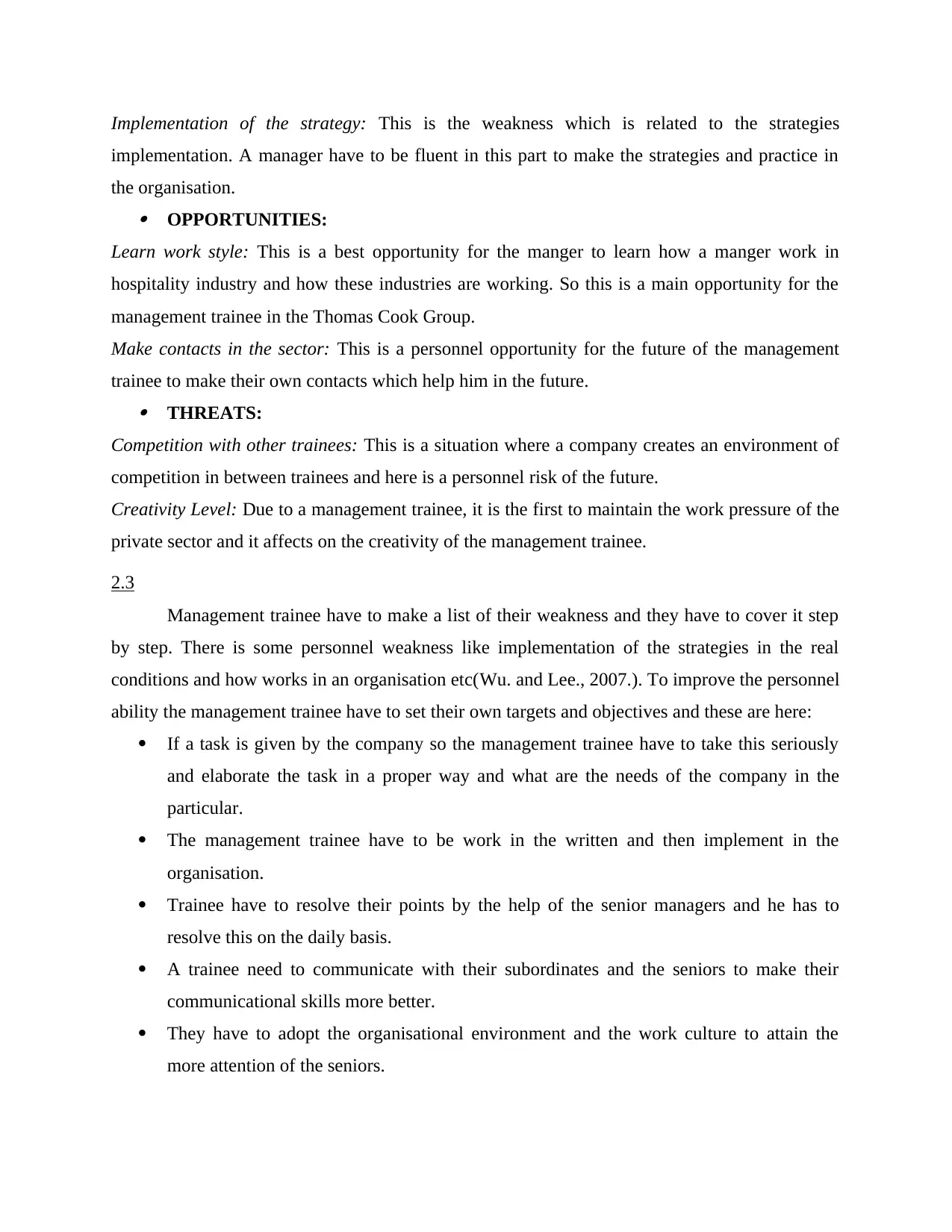
Implementation of the strategy: This is the weakness which is related to the strategies
implementation. A manager have to be fluent in this part to make the strategies and practice in
the organisation. OPPORTUNITIES:
Learn work style: This is a best opportunity for the manger to learn how a manger work in
hospitality industry and how these industries are working. So this is a main opportunity for the
management trainee in the Thomas Cook Group.
Make contacts in the sector: This is a personnel opportunity for the future of the management
trainee to make their own contacts which help him in the future. THREATS:
Competition with other trainees: This is a situation where a company creates an environment of
competition in between trainees and here is a personnel risk of the future.
Creativity Level: Due to a management trainee, it is the first to maintain the work pressure of the
private sector and it affects on the creativity of the management trainee.
2.3
Management trainee have to make a list of their weakness and they have to cover it step
by step. There is some personnel weakness like implementation of the strategies in the real
conditions and how works in an organisation etc(Wu. and Lee., 2007.). To improve the personnel
ability the management trainee have to set their own targets and objectives and these are here:
If a task is given by the company so the management trainee have to take this seriously
and elaborate the task in a proper way and what are the needs of the company in the
particular.
The management trainee have to be work in the written and then implement in the
organisation.
Trainee have to resolve their points by the help of the senior managers and he has to
resolve this on the daily basis.
A trainee need to communicate with their subordinates and the seniors to make their
communicational skills more better.
They have to adopt the organisational environment and the work culture to attain the
more attention of the seniors.
implementation. A manager have to be fluent in this part to make the strategies and practice in
the organisation. OPPORTUNITIES:
Learn work style: This is a best opportunity for the manger to learn how a manger work in
hospitality industry and how these industries are working. So this is a main opportunity for the
management trainee in the Thomas Cook Group.
Make contacts in the sector: This is a personnel opportunity for the future of the management
trainee to make their own contacts which help him in the future. THREATS:
Competition with other trainees: This is a situation where a company creates an environment of
competition in between trainees and here is a personnel risk of the future.
Creativity Level: Due to a management trainee, it is the first to maintain the work pressure of the
private sector and it affects on the creativity of the management trainee.
2.3
Management trainee have to make a list of their weakness and they have to cover it step
by step. There is some personnel weakness like implementation of the strategies in the real
conditions and how works in an organisation etc(Wu. and Lee., 2007.). To improve the personnel
ability the management trainee have to set their own targets and objectives and these are here:
If a task is given by the company so the management trainee have to take this seriously
and elaborate the task in a proper way and what are the needs of the company in the
particular.
The management trainee have to be work in the written and then implement in the
organisation.
Trainee have to resolve their points by the help of the senior managers and he has to
resolve this on the daily basis.
A trainee need to communicate with their subordinates and the seniors to make their
communicational skills more better.
They have to adopt the organisational environment and the work culture to attain the
more attention of the seniors.
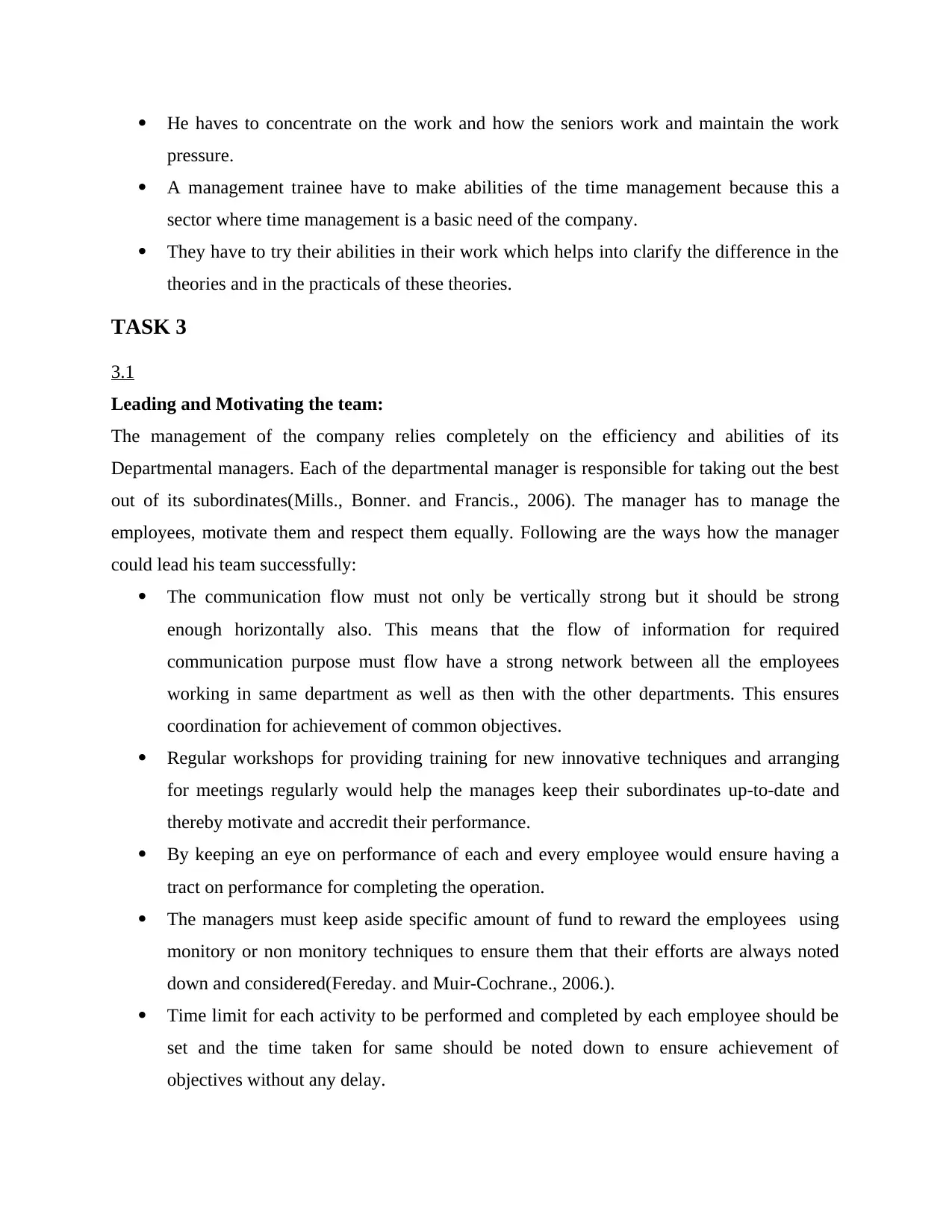
He haves to concentrate on the work and how the seniors work and maintain the work
pressure.
A management trainee have to make abilities of the time management because this a
sector where time management is a basic need of the company.
They have to try their abilities in their work which helps into clarify the difference in the
theories and in the practicals of these theories.
TASK 3
3.1
Leading and Motivating the team:
The management of the company relies completely on the efficiency and abilities of its
Departmental managers. Each of the departmental manager is responsible for taking out the best
out of its subordinates(Mills., Bonner. and Francis., 2006). The manager has to manage the
employees, motivate them and respect them equally. Following are the ways how the manager
could lead his team successfully:
The communication flow must not only be vertically strong but it should be strong
enough horizontally also. This means that the flow of information for required
communication purpose must flow have a strong network between all the employees
working in same department as well as then with the other departments. This ensures
coordination for achievement of common objectives.
Regular workshops for providing training for new innovative techniques and arranging
for meetings regularly would help the manages keep their subordinates up-to-date and
thereby motivate and accredit their performance.
By keeping an eye on performance of each and every employee would ensure having a
tract on performance for completing the operation.
The managers must keep aside specific amount of fund to reward the employees using
monitory or non monitory techniques to ensure them that their efforts are always noted
down and considered(Fereday. and Muir-Cochrane., 2006.).
Time limit for each activity to be performed and completed by each employee should be
set and the time taken for same should be noted down to ensure achievement of
objectives without any delay.
pressure.
A management trainee have to make abilities of the time management because this a
sector where time management is a basic need of the company.
They have to try their abilities in their work which helps into clarify the difference in the
theories and in the practicals of these theories.
TASK 3
3.1
Leading and Motivating the team:
The management of the company relies completely on the efficiency and abilities of its
Departmental managers. Each of the departmental manager is responsible for taking out the best
out of its subordinates(Mills., Bonner. and Francis., 2006). The manager has to manage the
employees, motivate them and respect them equally. Following are the ways how the manager
could lead his team successfully:
The communication flow must not only be vertically strong but it should be strong
enough horizontally also. This means that the flow of information for required
communication purpose must flow have a strong network between all the employees
working in same department as well as then with the other departments. This ensures
coordination for achievement of common objectives.
Regular workshops for providing training for new innovative techniques and arranging
for meetings regularly would help the manages keep their subordinates up-to-date and
thereby motivate and accredit their performance.
By keeping an eye on performance of each and every employee would ensure having a
tract on performance for completing the operation.
The managers must keep aside specific amount of fund to reward the employees using
monitory or non monitory techniques to ensure them that their efforts are always noted
down and considered(Fereday. and Muir-Cochrane., 2006.).
Time limit for each activity to be performed and completed by each employee should be
set and the time taken for same should be noted down to ensure achievement of
objectives without any delay.
⊘ This is a preview!⊘
Do you want full access?
Subscribe today to unlock all pages.

Trusted by 1+ million students worldwide
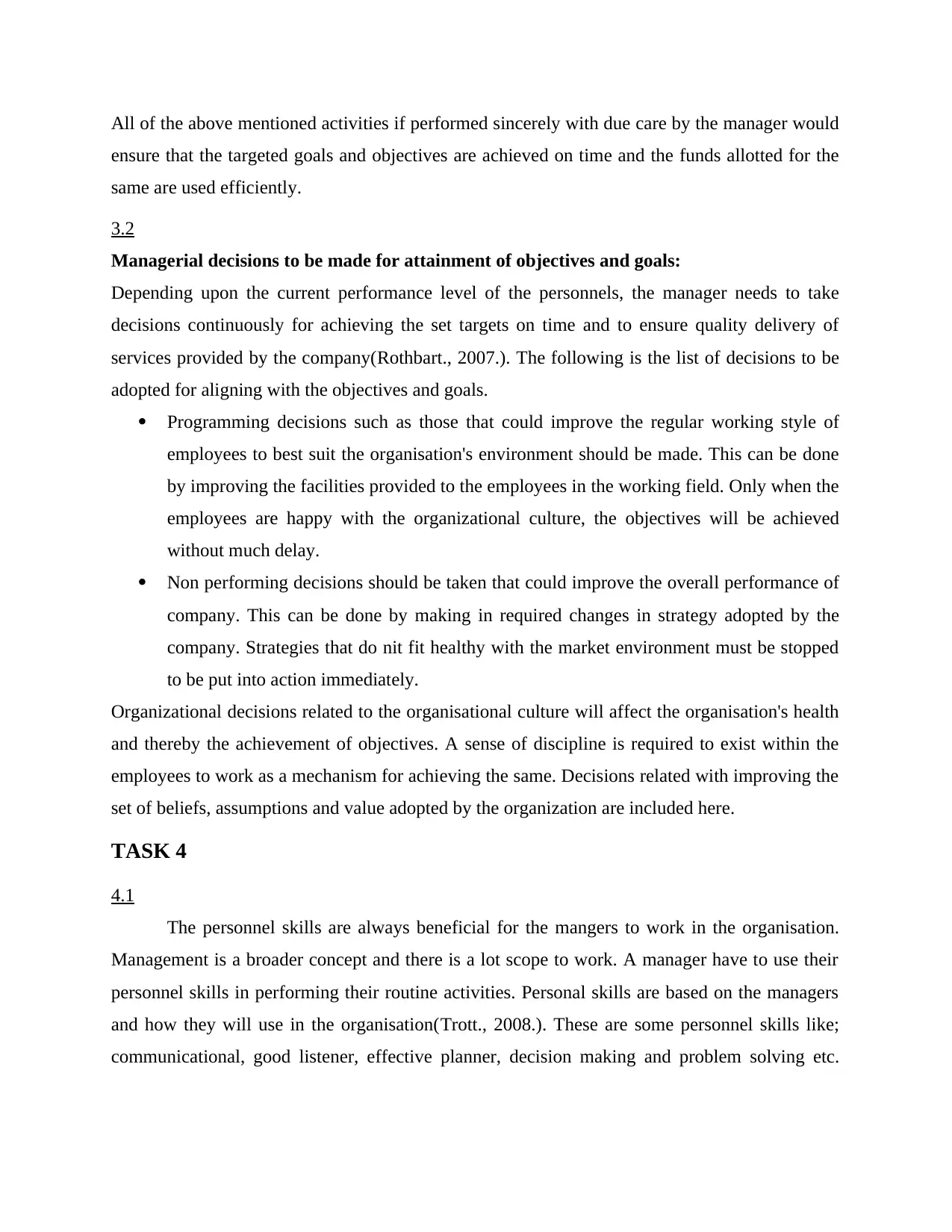
All of the above mentioned activities if performed sincerely with due care by the manager would
ensure that the targeted goals and objectives are achieved on time and the funds allotted for the
same are used efficiently.
3.2
Managerial decisions to be made for attainment of objectives and goals:
Depending upon the current performance level of the personnels, the manager needs to take
decisions continuously for achieving the set targets on time and to ensure quality delivery of
services provided by the company(Rothbart., 2007.). The following is the list of decisions to be
adopted for aligning with the objectives and goals.
Programming decisions such as those that could improve the regular working style of
employees to best suit the organisation's environment should be made. This can be done
by improving the facilities provided to the employees in the working field. Only when the
employees are happy with the organizational culture, the objectives will be achieved
without much delay.
Non performing decisions should be taken that could improve the overall performance of
company. This can be done by making in required changes in strategy adopted by the
company. Strategies that do nit fit healthy with the market environment must be stopped
to be put into action immediately.
Organizational decisions related to the organisational culture will affect the organisation's health
and thereby the achievement of objectives. A sense of discipline is required to exist within the
employees to work as a mechanism for achieving the same. Decisions related with improving the
set of beliefs, assumptions and value adopted by the organization are included here.
TASK 4
4.1
The personnel skills are always beneficial for the mangers to work in the organisation.
Management is a broader concept and there is a lot scope to work. A manager have to use their
personnel skills in performing their routine activities. Personal skills are based on the managers
and how they will use in the organisation(Trott., 2008.). These are some personnel skills like;
communicational, good listener, effective planner, decision making and problem solving etc.
ensure that the targeted goals and objectives are achieved on time and the funds allotted for the
same are used efficiently.
3.2
Managerial decisions to be made for attainment of objectives and goals:
Depending upon the current performance level of the personnels, the manager needs to take
decisions continuously for achieving the set targets on time and to ensure quality delivery of
services provided by the company(Rothbart., 2007.). The following is the list of decisions to be
adopted for aligning with the objectives and goals.
Programming decisions such as those that could improve the regular working style of
employees to best suit the organisation's environment should be made. This can be done
by improving the facilities provided to the employees in the working field. Only when the
employees are happy with the organizational culture, the objectives will be achieved
without much delay.
Non performing decisions should be taken that could improve the overall performance of
company. This can be done by making in required changes in strategy adopted by the
company. Strategies that do nit fit healthy with the market environment must be stopped
to be put into action immediately.
Organizational decisions related to the organisational culture will affect the organisation's health
and thereby the achievement of objectives. A sense of discipline is required to exist within the
employees to work as a mechanism for achieving the same. Decisions related with improving the
set of beliefs, assumptions and value adopted by the organization are included here.
TASK 4
4.1
The personnel skills are always beneficial for the mangers to work in the organisation.
Management is a broader concept and there is a lot scope to work. A manager have to use their
personnel skills in performing their routine activities. Personal skills are based on the managers
and how they will use in the organisation(Trott., 2008.). These are some personnel skills like;
communicational, good listener, effective planner, decision making and problem solving etc.
Paraphrase This Document
Need a fresh take? Get an instant paraphrase of this document with our AI Paraphraser
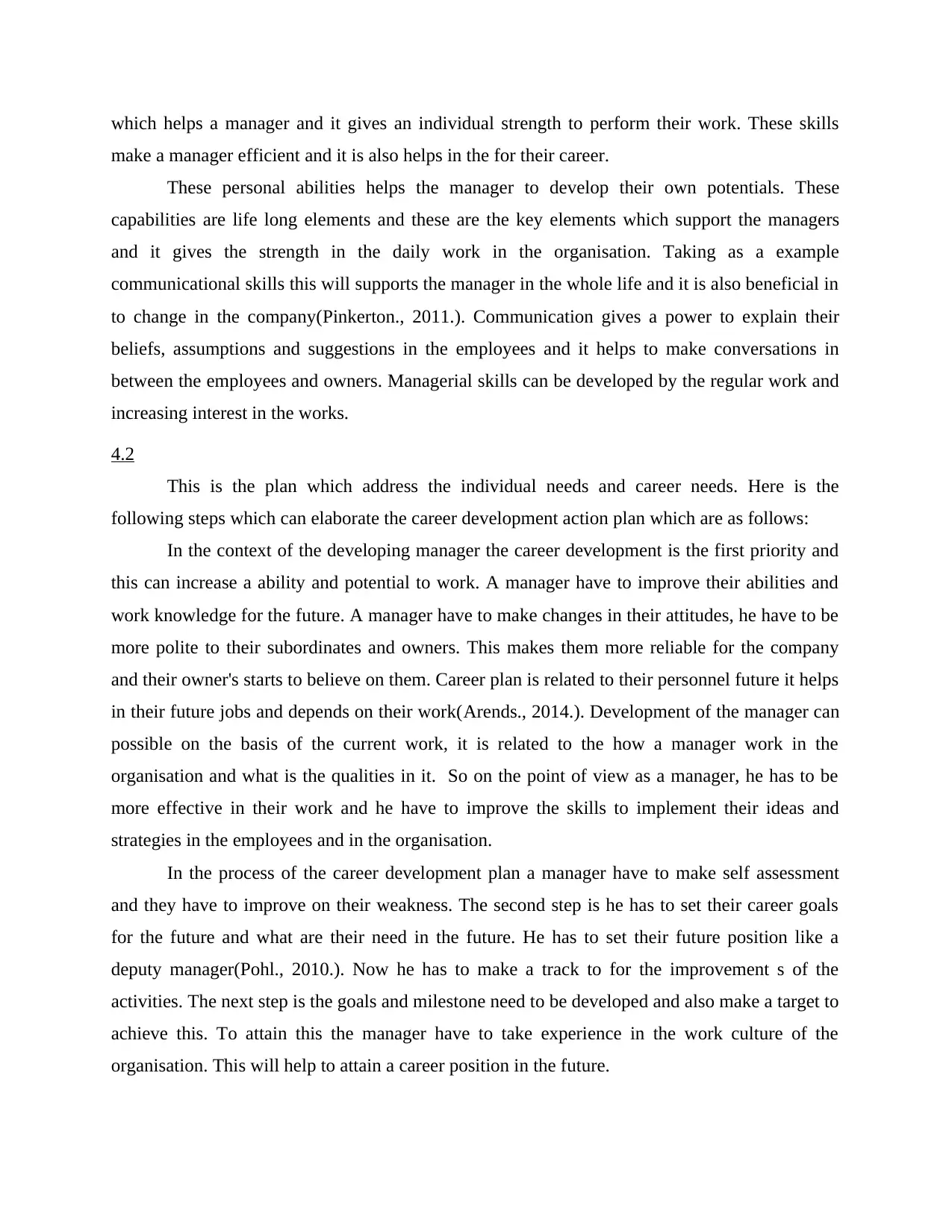
which helps a manager and it gives an individual strength to perform their work. These skills
make a manager efficient and it is also helps in the for their career.
These personal abilities helps the manager to develop their own potentials. These
capabilities are life long elements and these are the key elements which support the managers
and it gives the strength in the daily work in the organisation. Taking as a example
communicational skills this will supports the manager in the whole life and it is also beneficial in
to change in the company(Pinkerton., 2011.). Communication gives a power to explain their
beliefs, assumptions and suggestions in the employees and it helps to make conversations in
between the employees and owners. Managerial skills can be developed by the regular work and
increasing interest in the works.
4.2
This is the plan which address the individual needs and career needs. Here is the
following steps which can elaborate the career development action plan which are as follows:
In the context of the developing manager the career development is the first priority and
this can increase a ability and potential to work. A manager have to improve their abilities and
work knowledge for the future. A manager have to make changes in their attitudes, he have to be
more polite to their subordinates and owners. This makes them more reliable for the company
and their owner's starts to believe on them. Career plan is related to their personnel future it helps
in their future jobs and depends on their work(Arends., 2014.). Development of the manager can
possible on the basis of the current work, it is related to the how a manager work in the
organisation and what is the qualities in it. So on the point of view as a manager, he has to be
more effective in their work and he have to improve the skills to implement their ideas and
strategies in the employees and in the organisation.
In the process of the career development plan a manager have to make self assessment
and they have to improve on their weakness. The second step is he has to set their career goals
for the future and what are their need in the future. He has to set their future position like a
deputy manager(Pohl., 2010.). Now he has to make a track to for the improvement s of the
activities. The next step is the goals and milestone need to be developed and also make a target to
achieve this. To attain this the manager have to take experience in the work culture of the
organisation. This will help to attain a career position in the future.
make a manager efficient and it is also helps in the for their career.
These personal abilities helps the manager to develop their own potentials. These
capabilities are life long elements and these are the key elements which support the managers
and it gives the strength in the daily work in the organisation. Taking as a example
communicational skills this will supports the manager in the whole life and it is also beneficial in
to change in the company(Pinkerton., 2011.). Communication gives a power to explain their
beliefs, assumptions and suggestions in the employees and it helps to make conversations in
between the employees and owners. Managerial skills can be developed by the regular work and
increasing interest in the works.
4.2
This is the plan which address the individual needs and career needs. Here is the
following steps which can elaborate the career development action plan which are as follows:
In the context of the developing manager the career development is the first priority and
this can increase a ability and potential to work. A manager have to improve their abilities and
work knowledge for the future. A manager have to make changes in their attitudes, he have to be
more polite to their subordinates and owners. This makes them more reliable for the company
and their owner's starts to believe on them. Career plan is related to their personnel future it helps
in their future jobs and depends on their work(Arends., 2014.). Development of the manager can
possible on the basis of the current work, it is related to the how a manager work in the
organisation and what is the qualities in it. So on the point of view as a manager, he has to be
more effective in their work and he have to improve the skills to implement their ideas and
strategies in the employees and in the organisation.
In the process of the career development plan a manager have to make self assessment
and they have to improve on their weakness. The second step is he has to set their career goals
for the future and what are their need in the future. He has to set their future position like a
deputy manager(Pohl., 2010.). Now he has to make a track to for the improvement s of the
activities. The next step is the goals and milestone need to be developed and also make a target to
achieve this. To attain this the manager have to take experience in the work culture of the
organisation. This will help to attain a career position in the future.
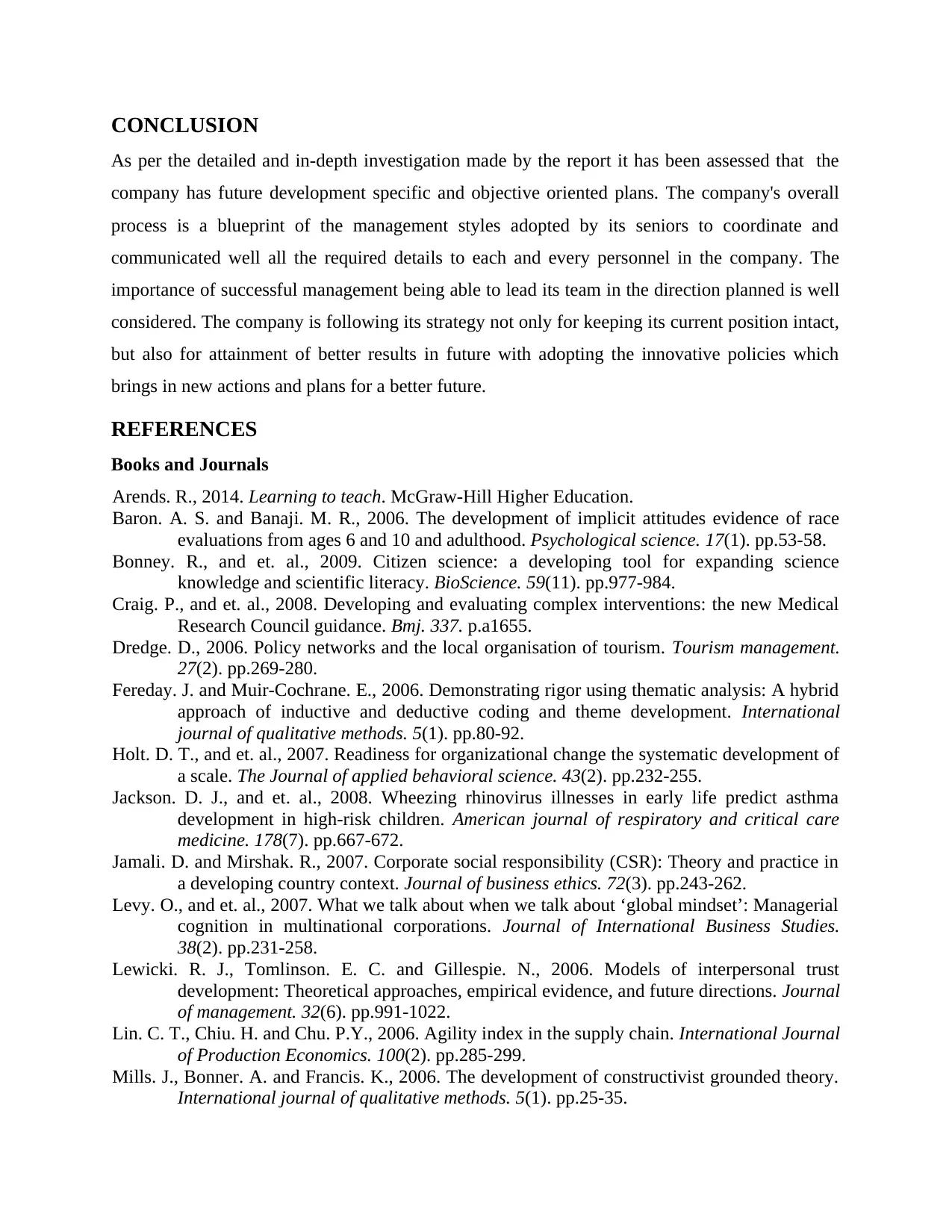
CONCLUSION
As per the detailed and in-depth investigation made by the report it has been assessed that the
company has future development specific and objective oriented plans. The company's overall
process is a blueprint of the management styles adopted by its seniors to coordinate and
communicated well all the required details to each and every personnel in the company. The
importance of successful management being able to lead its team in the direction planned is well
considered. The company is following its strategy not only for keeping its current position intact,
but also for attainment of better results in future with adopting the innovative policies which
brings in new actions and plans for a better future.
REFERENCES
Books and Journals
Arends. R., 2014. Learning to teach. McGraw-Hill Higher Education.
Baron. A. S. and Banaji. M. R., 2006. The development of implicit attitudes evidence of race
evaluations from ages 6 and 10 and adulthood. Psychological science. 17(1). pp.53-58.
Bonney. R., and et. al., 2009. Citizen science: a developing tool for expanding science
knowledge and scientific literacy. BioScience. 59(11). pp.977-984.
Craig. P., and et. al., 2008. Developing and evaluating complex interventions: the new Medical
Research Council guidance. Bmj. 337. p.a1655.
Dredge. D., 2006. Policy networks and the local organisation of tourism. Tourism management.
27(2). pp.269-280.
Fereday. J. and Muir-Cochrane. E., 2006. Demonstrating rigor using thematic analysis: A hybrid
approach of inductive and deductive coding and theme development. International
journal of qualitative methods. 5(1). pp.80-92.
Holt. D. T., and et. al., 2007. Readiness for organizational change the systematic development of
a scale. The Journal of applied behavioral science. 43(2). pp.232-255.
Jackson. D. J., and et. al., 2008. Wheezing rhinovirus illnesses in early life predict asthma
development in high-risk children. American journal of respiratory and critical care
medicine. 178(7). pp.667-672.
Jamali. D. and Mirshak. R., 2007. Corporate social responsibility (CSR): Theory and practice in
a developing country context. Journal of business ethics. 72(3). pp.243-262.
Levy. O., and et. al., 2007. What we talk about when we talk about ‘global mindset’: Managerial
cognition in multinational corporations. Journal of International Business Studies.
38(2). pp.231-258.
Lewicki. R. J., Tomlinson. E. C. and Gillespie. N., 2006. Models of interpersonal trust
development: Theoretical approaches, empirical evidence, and future directions. Journal
of management. 32(6). pp.991-1022.
Lin. C. T., Chiu. H. and Chu. P.Y., 2006. Agility index in the supply chain. International Journal
of Production Economics. 100(2). pp.285-299.
Mills. J., Bonner. A. and Francis. K., 2006. The development of constructivist grounded theory.
International journal of qualitative methods. 5(1). pp.25-35.
As per the detailed and in-depth investigation made by the report it has been assessed that the
company has future development specific and objective oriented plans. The company's overall
process is a blueprint of the management styles adopted by its seniors to coordinate and
communicated well all the required details to each and every personnel in the company. The
importance of successful management being able to lead its team in the direction planned is well
considered. The company is following its strategy not only for keeping its current position intact,
but also for attainment of better results in future with adopting the innovative policies which
brings in new actions and plans for a better future.
REFERENCES
Books and Journals
Arends. R., 2014. Learning to teach. McGraw-Hill Higher Education.
Baron. A. S. and Banaji. M. R., 2006. The development of implicit attitudes evidence of race
evaluations from ages 6 and 10 and adulthood. Psychological science. 17(1). pp.53-58.
Bonney. R., and et. al., 2009. Citizen science: a developing tool for expanding science
knowledge and scientific literacy. BioScience. 59(11). pp.977-984.
Craig. P., and et. al., 2008. Developing and evaluating complex interventions: the new Medical
Research Council guidance. Bmj. 337. p.a1655.
Dredge. D., 2006. Policy networks and the local organisation of tourism. Tourism management.
27(2). pp.269-280.
Fereday. J. and Muir-Cochrane. E., 2006. Demonstrating rigor using thematic analysis: A hybrid
approach of inductive and deductive coding and theme development. International
journal of qualitative methods. 5(1). pp.80-92.
Holt. D. T., and et. al., 2007. Readiness for organizational change the systematic development of
a scale. The Journal of applied behavioral science. 43(2). pp.232-255.
Jackson. D. J., and et. al., 2008. Wheezing rhinovirus illnesses in early life predict asthma
development in high-risk children. American journal of respiratory and critical care
medicine. 178(7). pp.667-672.
Jamali. D. and Mirshak. R., 2007. Corporate social responsibility (CSR): Theory and practice in
a developing country context. Journal of business ethics. 72(3). pp.243-262.
Levy. O., and et. al., 2007. What we talk about when we talk about ‘global mindset’: Managerial
cognition in multinational corporations. Journal of International Business Studies.
38(2). pp.231-258.
Lewicki. R. J., Tomlinson. E. C. and Gillespie. N., 2006. Models of interpersonal trust
development: Theoretical approaches, empirical evidence, and future directions. Journal
of management. 32(6). pp.991-1022.
Lin. C. T., Chiu. H. and Chu. P.Y., 2006. Agility index in the supply chain. International Journal
of Production Economics. 100(2). pp.285-299.
Mills. J., Bonner. A. and Francis. K., 2006. The development of constructivist grounded theory.
International journal of qualitative methods. 5(1). pp.25-35.
⊘ This is a preview!⊘
Do you want full access?
Subscribe today to unlock all pages.

Trusted by 1+ million students worldwide
1 out of 13
Related Documents
Your All-in-One AI-Powered Toolkit for Academic Success.
+13062052269
info@desklib.com
Available 24*7 on WhatsApp / Email
![[object Object]](/_next/static/media/star-bottom.7253800d.svg)
Unlock your academic potential
Copyright © 2020–2025 A2Z Services. All Rights Reserved. Developed and managed by ZUCOL.





